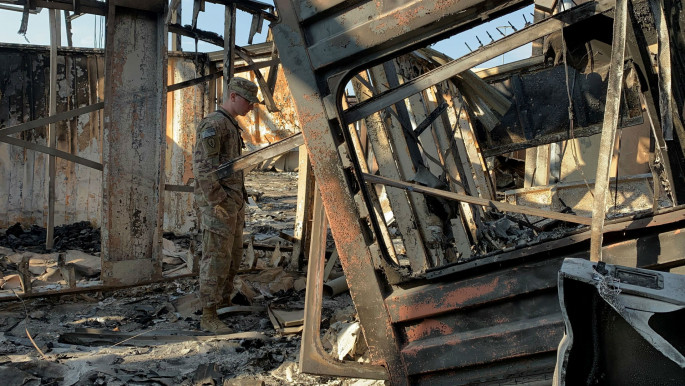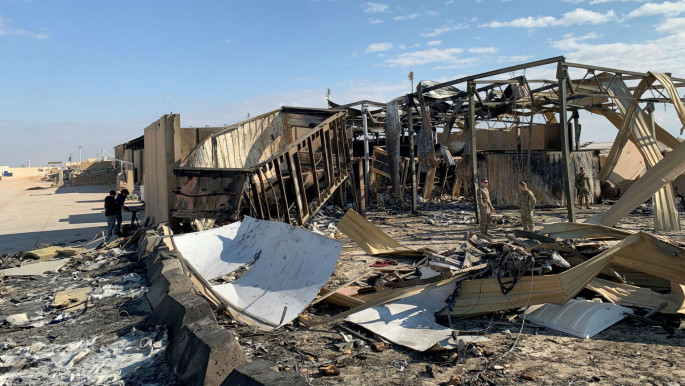US troops hid in Saddam-era bunkers to escape Iran missiles in 'miraculous' survival
US troops have revealed details about Iran's ballistic missile strike on Ain al-Asad airbase, detailing damage to the base and relief that they had survived.
3 min read
Iraq called the Iran strike an attack on its sovereignty [Getty]
American troops at the Ain Al-Asad air base in Iraq have revealed that it was a "miracle" they had survived Tehran's first direct missile attack against US forces.
Iran had targeted two air bases in Iraq, Ain al-Asad in the western Anbar desert and Irbil, and though there were no casualties, the bases sustained extensive damage.
"It's miraculous no one was hurt," Lt Col Staci Coleman, the US air force officer who runs the airfield told reporters on Monday.
"Who thinks they're going to have ballistic missiles launched at them…and suffer no casualties?" she added.
The attack on the bases came on 8 January, just hours after US Defence Secretary Mark Esper warned US President Donald Trump that he should expect retaliation over the killing of Iranian commander Qasem Soleimani in a drone strike in Baghdad last week.
Damaged bases
At one site, a cruise missile had left a large crater and destroyed living quarters made from shipping containers.
The destruction didn't end there: heavy concrete blast walls were knocked over and shipping containers were smashed, their contents of bicycles, chairs and other furniture also destroyed.
Soldiers said one of their own had come close to being blown up inside a shelter behind the blast walls.
The US did not have Patriot air defenses at the base, and soldiers relied on local commanders to protect their troops.
The air base is one of the largest and biggest in the country but lacks sufficient surface-to-air defenses, as the US did not build such structures on the base.
"We'd got notification there could be an attack a few hours prior so had moved equipment," said US Staff Sergeant Tommie Caldwell.
A few days after the missile attack, Iran claimed to have killed 80 US troops, which it called "American terrorists".
However, news broke that Iran had informed Iraq's caretaker Prime Minister Adel Abdel Mahdi that a missile attack on one of the country's bases hosting US troops was imminent.
Finland was also given warning prior to the strike, and respective governments confirmed that there were no deaths despite Iran's contrary claim.
Lt Col Coleman recalled that by 10pm all staff in her care had taken cover.
"People took this very seriously," she said, and three-and-a-half hours later the missiles rained down.
The assault, soldiers said, went on for two hours.
Akeem Ferguson, who had been in a Saddam Hussein-era bunker, recalled the moment his team received a terrifying transmission - six Iranian ballistic missiles were headed their way.
"I held on to my gun and put my head down and I tried to find a happy place, so I started singing to my daughters in my head," the US staff sergeant told CNN. "And I just waited. I hoped that whatever happened, that it was quick."
"I was 100 per cent ready to die," he added.
"When a rocket strikes that's one thing; but a ballistic missile, it’s like terror," said staff Sgt Armando Martinez, who had been on casualty watch.
"We must have been in the bunkers for more than five hours, maybe seven or eight," added Kenneth Goodwin, Master Sgt in the US Air Force, according to Reuters.
"They knew what they were aiming at by targeting the airfield and parking area."
Iran had targeted two air bases in Iraq, Ain al-Asad in the western Anbar desert and Irbil, and though there were no casualties, the bases sustained extensive damage.
"It's miraculous no one was hurt," Lt Col Staci Coleman, the US air force officer who runs the airfield told reporters on Monday.
"Who thinks they're going to have ballistic missiles launched at them…and suffer no casualties?" she added.
The attack on the bases came on 8 January, just hours after US Defence Secretary Mark Esper warned US President Donald Trump that he should expect retaliation over the killing of Iranian commander Qasem Soleimani in a drone strike in Baghdad last week.
Damaged bases
At one site, a cruise missile had left a large crater and destroyed living quarters made from shipping containers.
The destruction didn't end there: heavy concrete blast walls were knocked over and shipping containers were smashed, their contents of bicycles, chairs and other furniture also destroyed.
Soldiers said one of their own had come close to being blown up inside a shelter behind the blast walls.
The US did not have Patriot air defenses at the base, and soldiers relied on local commanders to protect their troops.
 |
| Ain al-Asad was severely damaged [Getty] |
The air base is one of the largest and biggest in the country but lacks sufficient surface-to-air defenses, as the US did not build such structures on the base.
"We'd got notification there could be an attack a few hours prior so had moved equipment," said US Staff Sergeant Tommie Caldwell.
A few days after the missile attack, Iran claimed to have killed 80 US troops, which it called "American terrorists".
However, news broke that Iran had informed Iraq's caretaker Prime Minister Adel Abdel Mahdi that a missile attack on one of the country's bases hosting US troops was imminent.
Finland was also given warning prior to the strike, and respective governments confirmed that there were no deaths despite Iran's contrary claim.
Lt Col Coleman recalled that by 10pm all staff in her care had taken cover.
"People took this very seriously," she said, and three-and-a-half hours later the missiles rained down.
The assault, soldiers said, went on for two hours.
 |
| There were no casualties [Getty] |
"I held on to my gun and put my head down and I tried to find a happy place, so I started singing to my daughters in my head," the US staff sergeant told CNN. "And I just waited. I hoped that whatever happened, that it was quick."
"I was 100 per cent ready to die," he added.
"When a rocket strikes that's one thing; but a ballistic missile, it’s like terror," said staff Sgt Armando Martinez, who had been on casualty watch.
"We must have been in the bunkers for more than five hours, maybe seven or eight," added Kenneth Goodwin, Master Sgt in the US Air Force, according to Reuters.
"They knew what they were aiming at by targeting the airfield and parking area."





 Follow the Middle East's top stories in English at The New Arab on Google News
Follow the Middle East's top stories in English at The New Arab on Google News

![Israeli forces ordered bombed Gaza's Jabalia, ordering residents to leave [Getty]](/sites/default/files/styles/image_330x185/public/2176418030.jpeg?h=a5f2f23a&itok=_YGZaP1z)
